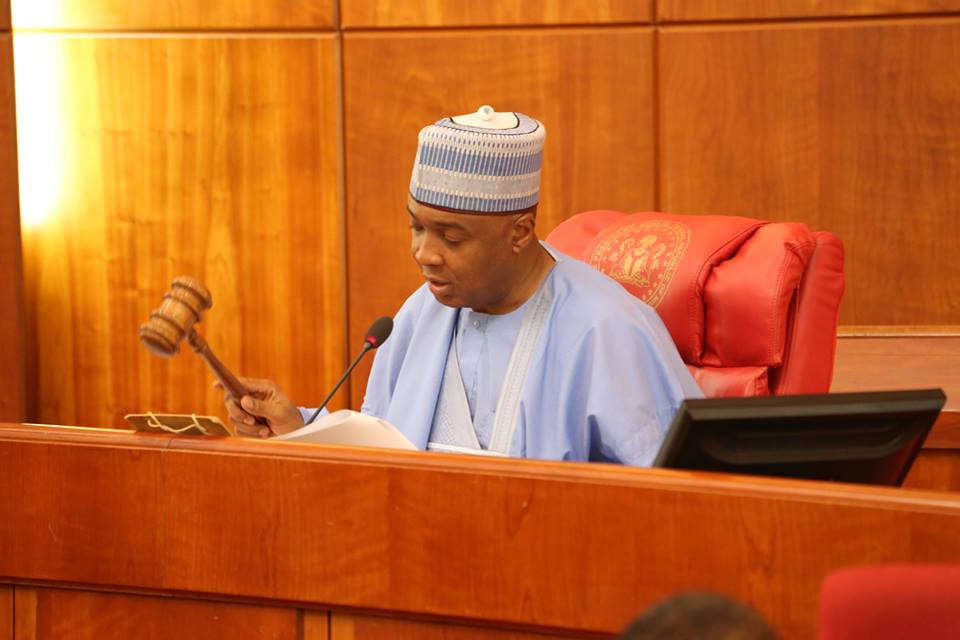BY JAMES SUNDAY
The Nigerian 8th Senate made history on the 16th of June, by passing an elaborate amendment to the Public Procurement Act to provide for and adopt Local Content Policy and timely completion of procurement processes with a view to stimulating the economy through patronage of locally produced goods and services.
This amendment is one of the most momentous achievements of the 8th Senate led by Senator Bukola Saraki. This of course is owing to the patriotic zeal with which the Red Chamber lawmakers pushed for the expeditious passage of the Bill, which has now made it mandatory for procuring entities to give preferences to domestically manufactured goods, products and services.
Worthy of note is section 34 of the principal Act which the Senate amended by substituting the existing subsection (1) with a new section which stipulates that: “a procuring entity shall grant a margin of preferences in the evaluation of tenders when comparing tenders from domestic bidders with those from foreign bidders or when comparing tenders from domestic suppliers offering goods manufactured locally with those offering goods manufactured abroad”
The usage of the word ‘shall’ as captured in the new amendment does the trick as non-compliance with the provision of this subsection is now expressly an offence. The change of the key word in the section from ‘May’ to ‘Shall’, makes it mandatory for government agencies to patronise made-in-Nigeria goods. This will go a long way in increasing quantity and quality of local goods produced, as the new amendment by the Senate has now changed the percentage in the Act which previously made only 15 per cent of locally procured goods mandatory.
Advertisement
Pundits and analysts have suggested that this move will bring a ripple effect into the economy to help Nigeria out of the current economic situation.
Earlier, Senate President Bukola Saraki warned that once the bill is passed, it will become an offence for anyone in government to buy products that are not made in Nigeria. He also emphasied that the bill will help to slash days for processing contracts by half. This, in his view, was aimed at making the Nigerian public procurement system support the budget to stimulate the economy and also to encourage those who have chosen to invest in Nigeria.
He also noted that with the amendment, a substantial percentage of the N6 Trillion in 2016 Budget will be retained in Nigeria and in the pockets of Nigerians. Nigerians are known to patronise products manufactured outside the shores of the country, while publicly expressing their disdain for made-in-Nigeria goods.
Advertisement
One of the other interesting innovations brought in by the Senate in the amendment, particularly in section 15 which stipulates that: “subject to the provision of the Infrastructure Concession Regulatory Commission Act, the provisions of this Act shall apply to all procurement of goods, works and services carried out by (a) the federal government of Nigeria and all procurement entities and (b) all entities outside the foregoing which derives atleast thirty five percent of the funds appropriated or proposed to be appropriated for any type of any procurement described in this Act from the federation share of Consolidated Revenue Fund”.
This generally implies that the new public procurement Act applies to federal government ministries, departments and agencies; enterprise, corporations, councils, authorities and commissions, provided they utilise public funds
This would go along way to boost quality and quantity of locally manufactured goods and service, as low patronage has always been the major factor militating against the production of quality local products
The 8th Senate deserves all the praises and litanies because this legislation, if fully complied with, would turn around the fortune of Nigeria and the possibility of becoming a major exporting country. It will also drive self sufficiency and growth.
Advertisement
Nigeria as a country has over the years refused to improve on her production techniques, but depends on technologically advanced nations for the bulk of her consumables. This legislation by the 8th Senate has clearly shown that the republic and its people have realized the essence of being independent in a true sense. The 8th Senate has by this legislation kick-started the process reviving infant industries, and reawakening dead and moribund once so that they can function effectively to meet the demands of the new market that has been created by the Senate through the amendment to the Public Procurement Act which will in turn generate avenue for employment and wealth creation.
The Senate president has also demonstrated personal commitment to the #buynaija project. His patronage of locally made products shows the seriousness of the upper chamber to the Nigerian cause.
With proper implementation, this new amendment as passed by the 8th Senate would conserve the nation’s foreign reserve, strengthen the naira against the dollar, and encourage technology transfer.
The 8th senate has opened the flood gate of industrialisation towards self sufficiency and may perhaps have lived up to its creed as contained in its legislative agenda.
Advertisement
Views expressed by contributors are strictly personal and not of TheCable.
Add a comment






